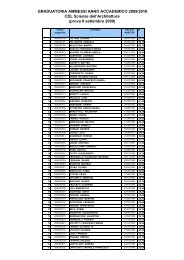School of Science and Technology Technologies for the ...
School of Science and Technology Technologies for the ...
School of Science and Technology Technologies for the ...
You also want an ePaper? Increase the reach of your titles
YUMPU automatically turns print PDFs into web optimized ePapers that Google loves.
<strong>School</strong> <strong>of</strong> <strong>Science</strong> <strong>and</strong> <strong>Technology</strong><br />
Undergraduate degree course in<br />
<strong>Technologies</strong> <strong>for</strong> <strong>the</strong> Conservation <strong>and</strong> <strong>the</strong> Restoration<br />
Course duration: 3 years<br />
Total credits to be acquired: 180<br />
Main teaching building:<br />
Polo Didattico, Largo Cattaneo 4<br />
Ascoli Piceno,<br />
(Class L - 43)<br />
GUIDELINES<br />
Academic Year 2010-2011
UNICAM – University <strong>of</strong> Camerino<br />
<strong>School</strong> <strong>of</strong> <strong>Science</strong> <strong>and</strong> <strong>Technology</strong><br />
Degree course in <strong>Technologies</strong> <strong>for</strong> <strong>the</strong> Conservation <strong>and</strong> <strong>the</strong> Restoration (Class L-43)<br />
1. Contacts <strong>and</strong> in<strong>for</strong>mations:<br />
Dean <strong>of</strong> <strong>School</strong>: pr<strong>of</strong>. Roberto Ballini<br />
tel: 0737-402125;<br />
fax: 0737-402127;<br />
e.mail: preside.scienze@unicam.it<br />
Degree coordinator: pr<strong>of</strong>. Gabriele Renzi<br />
tel: 0737-402219, 329-2609940;<br />
fax: 0737-637345;<br />
e.mail: gabriele.renzi@unicam.it<br />
Teaching activity manager: dr. Anna Maria Santroni<br />
tel: 0737-402849;<br />
fax: 0737-402127;<br />
e.mail: annamaria.santroni@unicam.it<br />
Delegates to support services <strong>for</strong> teaching:<br />
Student advisory service: dr.Graziella Roselli<br />
tel: 0737-402219, 366-2486092;<br />
fax: 0737-637345;<br />
e.mail: graziella.roselli@unicam.it<br />
Tutoring coordinator: dr. Isolina Marota<br />
tel: 0737-403264, 320-4381471;<br />
e.mail: isolina.marota@unicam.it<br />
Internationalisation <strong>and</strong> Erasmus coordinator: dr. Roberto Tossici<br />
tel: 0737-402210;<br />
e.mail: roberto.tossici@unicam.it<br />
Placement coordinator: pr<strong>of</strong>. Gabriele Renzi<br />
tel: 0737-402219, 329-2609940;<br />
fax: 0737-637345;<br />
e.mail: gabriele.renzi@unicam.it<br />
Enrolment <strong>and</strong> in<strong>for</strong>mation <strong>of</strong>fice: Stefano Burotti<br />
Corso Mazzini 210, 63100 Ascoli Piceno<br />
tel: 0736-240160;<br />
fax: 0736-240176;<br />
e.mail: segreteria.restauro@unicam.it<br />
Website <strong>of</strong> school: http://fast.unicam.it<br />
Website degree course: http://l43unicam.weebly.com/index.html<br />
Pagina 2
UNICAM – University <strong>of</strong> Camerino<br />
<strong>School</strong> <strong>of</strong> <strong>Science</strong> <strong>and</strong> <strong>Technology</strong><br />
Degree course in <strong>Technologies</strong> <strong>for</strong> <strong>the</strong> Conservation <strong>and</strong> <strong>the</strong> Restoration (Class L-43)<br />
2. Course presentation<br />
Italian historical, artistic <strong>and</strong> architectural heritage, one <strong>of</strong> <strong>the</strong> richest in <strong>the</strong> world, represents a real source <strong>of</strong> wealth. It is<br />
<strong>the</strong>re<strong>for</strong>e fundamental that this heritage be studied, protected <strong>and</strong>, if necessary, restored. The degree course in<br />
<strong>Technologies</strong> <strong>for</strong> <strong>the</strong> Conservation <strong>and</strong> <strong>the</strong> Restoration <strong>of</strong> Cultural Heritage aims to meet <strong>the</strong>se needs. The graduate in<br />
<strong>Technologies</strong> <strong>for</strong> <strong>the</strong> Conservation <strong>and</strong> <strong>the</strong> Restoration responds to <strong>the</strong> dem<strong>and</strong> <strong>for</strong> new pr<strong>of</strong>essional figures <strong>of</strong> a<br />
technical/scientific nature able to conjugate historical, artistic <strong>and</strong> architectural knowledge with advanced scientific<br />
disciplines <strong>for</strong> <strong>the</strong> diagnosis, conservation <strong>and</strong> restoration <strong>of</strong> <strong>the</strong> cultural heritage. Degree course in <strong>Technologies</strong> <strong>for</strong> <strong>the</strong><br />
Conservation <strong>and</strong> <strong>the</strong> Restoration is a peculiarity among UNICAM degree courses: it is characterized by <strong>the</strong> coexistence <strong>of</strong><br />
scientific (ma<strong>the</strong>matics, physics, chemistry, biology, geology, etc.) <strong>and</strong> humanistic disciplines (art history, history <strong>of</strong><br />
architecture, museum science, etc) applied to <strong>the</strong> Conservation <strong>and</strong> <strong>the</strong> Restoration <strong>of</strong> Cultural Heritage. During <strong>the</strong>ir<br />
university career, students in <strong>Technologies</strong> <strong>for</strong> <strong>the</strong> Conservation <strong>and</strong> <strong>the</strong> Restoration in UNICAM are flanked by pr<strong>of</strong>essors<br />
from both <strong>the</strong> <strong>School</strong>s <strong>of</strong> <strong>Science</strong>s <strong>and</strong> Architecture, as well as specialists from <strong>the</strong> public sector. The graduate in<br />
<strong>Technology</strong> <strong>for</strong> <strong>the</strong> Conservation <strong>and</strong> Restoration will be able to work as an art restoration technician.<br />
3. Educational goals<br />
The degree course in <strong>Technologies</strong> <strong>for</strong> <strong>the</strong> Conservation <strong>and</strong> <strong>the</strong> Restoration responds to <strong>the</strong> dem<strong>and</strong> <strong>for</strong> new pr<strong>of</strong>essional<br />
figures <strong>of</strong> a technical/scientific nature qualified to carry out skilled activities to promote <strong>the</strong> knowledge, control,<br />
conservation <strong>and</strong> pr<strong>of</strong>itable use <strong>of</strong> <strong>the</strong> cultural heritage. Upon graduation, students are qualified Technicians <strong>for</strong> <strong>the</strong><br />
Conservation <strong>and</strong> Restoration <strong>of</strong> <strong>the</strong> Cultural Heritage, a pr<strong>of</strong>essional figure already present in o<strong>the</strong>r countries. The<br />
degree program includes both <strong>the</strong>oretical coursework to ensure that c<strong>and</strong>idates possess basic knowledge in chemistry,<br />
ma<strong>the</strong>matics, physics, mineralogy, biology, geology, etc., as well as practical laboratory activities. Graduates in <strong>Technology</strong><br />
<strong>for</strong> <strong>the</strong> Conservation <strong>and</strong> Restoration will possess <strong>the</strong> skills to identify specific cultural heritage, to recognize its state <strong>of</strong><br />
conservation <strong>and</strong> to reconstruct <strong>the</strong> context <strong>of</strong> its origin. Thus, graduates will possess <strong>the</strong> abilities to deploy <strong>the</strong><br />
appropriate processes <strong>for</strong> its safeguarding <strong>and</strong> development. Assessment is accomplished mainly through oral, or<br />
eventually, written exams. Practical laboratory activities will be assessed through in-lab testing.<br />
Expected learning outcomes (according to <strong>the</strong> descriptors <strong>of</strong> <strong>the</strong> European qualifications):<br />
Knowledge <strong>and</strong> underst<strong>and</strong>ing<br />
Graduates in <strong>Technology</strong> <strong>for</strong> <strong>the</strong> Conservation <strong>and</strong> Restoration will acquire knowledge <strong>and</strong> skills concerning <strong>the</strong> main<br />
scientific techniques <strong>for</strong> <strong>the</strong> conservation <strong>and</strong> restoration <strong>of</strong> <strong>the</strong> cultural heritage.<br />
In particular graduates will:<br />
- possess basic knowledge in <strong>the</strong> following scientific disciplines: chemistry, physics, biology, geology, archeometry;<br />
- possess basic knowledge in <strong>the</strong> following subjects: art history, history <strong>of</strong> architecture, history <strong>of</strong> restoration, museum<br />
science;<br />
- possess skills regarding materials <strong>and</strong> methods <strong>for</strong> <strong>the</strong> restoration;<br />
- be familiar with <strong>the</strong> legislation on cultural heritage.<br />
The above-listed knowledge <strong>and</strong> skills are achieved through lessons, attended by students, <strong>and</strong> which are flanked, where<br />
necessary, by seminars, practical exercises, guided home study <strong>and</strong> students' individual in-depth analyses.<br />
Assessment is per<strong>for</strong>med mainly through written exams during <strong>the</strong> course, as well as oral/written exams at <strong>the</strong> end <strong>of</strong> <strong>the</strong><br />
semester.<br />
applying knowledge <strong>and</strong> underst<strong>and</strong>ing<br />
Graduates:<br />
- are able to use techniques <strong>and</strong> chemical-physical instrumentation <strong>and</strong> apply <strong>the</strong>m to <strong>the</strong> conservation <strong>of</strong> <strong>the</strong> cultural<br />
heritage;<br />
- are capable <strong>of</strong> applying <strong>the</strong>ir knowledge to practical cases;<br />
- are able to participate in <strong>the</strong> planning <strong>and</strong> supervising <strong>of</strong> actions aimed at safeguarding <strong>and</strong> restoring cultural heritage<br />
based on <strong>the</strong>ir knowledge <strong>of</strong> <strong>the</strong> composition <strong>and</strong> <strong>the</strong> characteristics <strong>of</strong> <strong>the</strong> materials that make it up;<br />
- are able to analyze <strong>the</strong> state <strong>of</strong> preservation <strong>of</strong> <strong>the</strong> cultural heritage;<br />
- are capable <strong>of</strong> planning procedures aimed at safeguarding an architectural, historical, archeological, archiving<br />
(archiving <strong>and</strong> library disciplines), artistic (music, <strong>the</strong>atre, cinema) or anthropological cultural heritage;<br />
Pagina 3
UNICAM – University <strong>of</strong> Camerino<br />
<strong>School</strong> <strong>of</strong> <strong>Science</strong> <strong>and</strong> <strong>Technology</strong><br />
Degree course in <strong>Technologies</strong> <strong>for</strong> <strong>the</strong> Conservation <strong>and</strong> <strong>the</strong> Restoration (Class L-43)<br />
- can use <strong>the</strong> main computer s<strong>of</strong>tware programs to manage <strong>and</strong> process data.<br />
The above-listed knowledge <strong>and</strong> skills are achieved through lessons, laboratory activities, guided home study <strong>and</strong><br />
students' individual or group analyses.<br />
Assessment is per<strong>for</strong>med mainly through written exams during <strong>the</strong> course <strong>and</strong> oral /written exams at <strong>the</strong> end <strong>of</strong> <strong>the</strong><br />
semester.<br />
Making judgements<br />
Graduates:<br />
- are capable <strong>of</strong> collecting <strong>and</strong> underst<strong>and</strong>ing scientific data derived from observations <strong>and</strong> laboratory<br />
measurements;<br />
- are able to plan <strong>and</strong> carry out an experiment, making judgments to evaluate <strong>the</strong> results;<br />
- are able to <strong>for</strong>mulate an analytical problem <strong>and</strong> to propose ideas <strong>and</strong> solutions;<br />
- are capable <strong>of</strong> making judgments about important scientific <strong>and</strong> ethical problems;<br />
- are able to adapt to different projects <strong>and</strong> working environments, to collect <strong>and</strong> evaluate in<strong>for</strong>mation <strong>and</strong> data.<br />
The above-listed abilities are achieved through lessons, classroom exercises, as well as through guided home study <strong>and</strong><br />
stage or internship experiences. Assessment is per<strong>for</strong>med mainly through written exams during <strong>the</strong> course, oral/written<br />
exams at <strong>the</strong> end <strong>of</strong> <strong>the</strong> semester <strong>and</strong> final examination.<br />
Communication skills<br />
Graduates are capable <strong>of</strong> writing documents or communicating orally about results <strong>and</strong> <strong>the</strong> in<strong>for</strong>mation obtained from<br />
experimental data. They are able to describe <strong>the</strong> nature <strong>of</strong> <strong>the</strong> problems <strong>and</strong> propose possible solutions bearing in mind<br />
<strong>the</strong> context <strong>and</strong> <strong>the</strong> target audience (chemists, physics, biologists, geologists, archeologists, art historians, surveyors,<br />
technicians <strong>for</strong> <strong>the</strong> Conservation <strong>and</strong> Restoration <strong>of</strong> <strong>the</strong> Cultural Heritage, etc.). Graduates know at least one o<strong>the</strong>r<br />
European language, possess <strong>the</strong> ability to analyze <strong>and</strong> syn<strong>the</strong>size <strong>and</strong> are able to work in a team.<br />
The above-listed communication skills are developed during all <strong>the</strong> educational activities, in relation to <strong>the</strong> preparation <strong>of</strong><br />
oral communications <strong>and</strong> writing documents, during projects <strong>and</strong> in team activities which <strong>for</strong>esee a presentation <strong>of</strong> <strong>the</strong><br />
skills learned. Assessment is also per<strong>for</strong>med through <strong>the</strong> processing <strong>and</strong> <strong>the</strong> discussion <strong>of</strong> <strong>the</strong> final examination. Oral<br />
communication skills in particular are assessed during all <strong>the</strong> educational activities which <strong>for</strong>esee a presentation <strong>of</strong> <strong>the</strong><br />
skills learned, from oral exams, discussion <strong>of</strong> <strong>the</strong> projects, preparation <strong>of</strong> reports using principal s<strong>of</strong>tware programs.<br />
Learning skills<br />
Graduates:<br />
- are capable <strong>of</strong> developing learning skills, necessary to per<strong>for</strong>m future studies;<br />
- are able to acquire a method <strong>of</strong> study, <strong>the</strong> ability to work on a team <strong>and</strong> alone;<br />
- are able to work in pr<strong>of</strong>essional environments which require autonomous decision-making <strong>and</strong> to continue with<br />
<strong>the</strong>ir pr<strong>of</strong>essional training.<br />
The above-listed abilities are achieved through individual study as well as through guided home study, preparation <strong>of</strong><br />
seminars, preparation <strong>of</strong> <strong>the</strong> final examination <strong>and</strong> internship experiences. Assessment is per<strong>for</strong>med mainly through oral<br />
or written exams at <strong>the</strong> end <strong>of</strong> <strong>the</strong> semester, through <strong>the</strong> presentation <strong>of</strong> seminar activities <strong>and</strong> final examinations.<br />
4. Qualifications to access undergraduate degree course (D.M. 270/04)<br />
Applicants must have a diploma from <strong>the</strong> upper-level middle school or any o<strong>the</strong>r certificate obtained abroad <strong>and</strong><br />
recognized as suitable.<br />
The recent re<strong>for</strong>ms <strong>of</strong> Laurea courses (DM 270/04 art. 6) requires all Universities to organize entrance tests to assess <strong>the</strong><br />
level <strong>of</strong> preparation <strong>of</strong> new students <strong>and</strong> to organize remedial activities when deficiencies are identified.<br />
UNICAM organizes a test which, if not passed, does not preclude enrollment in Courses, but does permit an evaluation <strong>of</strong><br />
<strong>the</strong> student’s preparation in order to place <strong>the</strong>m in <strong>the</strong> best possible condition <strong>for</strong> managing with <strong>the</strong> University courses.<br />
A complementary English course is included <strong>for</strong> those who do not have <strong>the</strong> minimum basic knowledge.<br />
All in<strong>for</strong>mation is available at: http://www.unicam.it<br />
Pagina 4
UNICAM – University <strong>of</strong> Camerino<br />
<strong>School</strong> <strong>of</strong> <strong>Science</strong> <strong>and</strong> <strong>Technology</strong><br />
Degree course in <strong>Technologies</strong> <strong>for</strong> <strong>the</strong> Conservation <strong>and</strong> <strong>the</strong> Restoration (Class L-43)<br />
5. Employment prospects<br />
Italian law (D.Lgs. 24.01.2004 n.42, article 29, Codice dei beni culturali e del paesaggio) recognizes <strong>the</strong> qualification <strong>of</strong><br />
Technician <strong>for</strong> <strong>the</strong> Conservation <strong>and</strong> Restoration <strong>of</strong> Cultural Heritage <strong>for</strong> graduates in <strong>Technology</strong> <strong>for</strong> <strong>the</strong> Conservation<br />
<strong>and</strong> Restoration among those pr<strong>of</strong>essional roles related to activities complementary to conservation <strong>and</strong> restoration <strong>of</strong><br />
cultural heritage.<br />
The First Degree Course in <strong>Technology</strong> <strong>for</strong> <strong>the</strong> Conservation <strong>and</strong> Restoration enables graduates:<br />
- to participate in diagnostic techniques on historical, artistic, archaeological <strong>and</strong> cultural heritage;<br />
- to participate in <strong>the</strong> various phases <strong>of</strong> restoration on <strong>the</strong> basis <strong>of</strong> specific knowledge about <strong>the</strong> composition <strong>and</strong> <strong>the</strong><br />
materials <strong>of</strong> a work, as well as its state <strong>of</strong> preservation <strong>and</strong> <strong>the</strong> appropriate techniques to be used;<br />
- to participate in archeometric studies regarding cultural heritage (dating, origin, au<strong>the</strong>nticity, production methods,<br />
etc.).<br />
Graduates in <strong>Technology</strong> <strong>for</strong> <strong>the</strong> Conservation <strong>and</strong> Restoration will be able to work in:<br />
- Universities <strong>and</strong> Research Centers (management, conservation <strong>and</strong> protection <strong>of</strong> cultural heritage);<br />
- Government <strong>of</strong>fices, museums, libraries, archives, etc.;<br />
- Restoration laboratories;<br />
- Companies <strong>and</strong> pr<strong>of</strong>essional organizations working in <strong>the</strong> sector <strong>of</strong> cultural heritage management, conservation <strong>and</strong><br />
protection.<br />
The degree course in <strong>Technologies</strong> <strong>for</strong> <strong>the</strong> Conservation <strong>and</strong> <strong>the</strong> Restoration (L-43) enables its graduates access <strong>the</strong><br />
degree <strong>of</strong> class degree LM-11 "<strong>Science</strong> <strong>for</strong> Conservation <strong>and</strong> Restoration <strong>of</strong> Cultural Heritage" at any place where it is<br />
activated. Graduates will also continue its <strong>the</strong>oretical <strong>and</strong> practical training, attending a master level university.<br />
6. Organisation <strong>of</strong> teaching<br />
Be<strong>for</strong>e <strong>the</strong> courses, all students have <strong>the</strong> opportunity to participate in <strong>the</strong> "days <strong>of</strong> acclimatization" that UNICAM organizes<br />
every year in <strong>the</strong> first days <strong>of</strong> October (<strong>for</strong> info see <strong>the</strong> website <strong>of</strong> <strong>the</strong> University http://www.unicam.it ).<br />
European Credit Transfer <strong>and</strong> Accumulation System (ECTS)<br />
Student are assessed by credits to indicate <strong>the</strong>ir learning st<strong>and</strong>ard. The credits represent <strong>the</strong>ir learning work including<br />
individual studies <strong>and</strong> laboratory necessary to get <strong>the</strong> undergraduate Degree Course in <strong>Technology</strong> <strong>for</strong> <strong>the</strong> Conservation<br />
<strong>and</strong> Restoration.<br />
60 credits represent <strong>the</strong> medium study workload carried out by a full-time student with suitable starting preparation <strong>for</strong><br />
one academic year. Students have to get 180 credits <strong>and</strong> one credit is equal to a 25-hour st<strong>and</strong>ard workload <strong>for</strong> each<br />
student. For example, one credit might be equal to 8 hours <strong>of</strong> lectures in classroom or 10 hours in laboratory. The ratio <strong>of</strong><br />
time spent <strong>for</strong> tutored activities <strong>and</strong> time spent <strong>for</strong> individual studies within <strong>the</strong> program <strong>of</strong> training activities should<br />
usually be about 1:3. These figures may vary according to <strong>the</strong> kind <strong>of</strong> course. Moreover a credit should represent a 25hours<br />
workload <strong>for</strong> a student who is getting ready <strong>for</strong> <strong>the</strong> final exam <strong>and</strong> possible placement.<br />
Lecture <strong>and</strong> exam calendar<br />
All activities concerning ECTS must be ossesse. The assessment is espresse by specific committees chaired by <strong>the</strong> staff in<br />
charge <strong>of</strong> training activities. Course can be ei<strong>the</strong>r individual or integrated with a corresponding laboratory module. There<br />
will one single exam in case <strong>of</strong> complementary courses. Course examinations are usually carried out written <strong>and</strong>/or oral. If<br />
not different indicated, training activities are assessed by a grade expressed in 30ths.<br />
Verification <strong>of</strong> attendance <strong>and</strong> a report on activities carried out <strong>and</strong> signed by <strong>the</strong> teacher are necessary to give credits <strong>for</strong><br />
placements.<br />
Pagina 5
UNICAM – University <strong>of</strong> Camerino<br />
<strong>School</strong> <strong>of</strong> <strong>Science</strong> <strong>and</strong> <strong>Technology</strong><br />
Degree course in <strong>Technologies</strong> <strong>for</strong> <strong>the</strong> Conservation <strong>and</strong> <strong>the</strong> Restoration (Class L-43)<br />
Teaching activities (including foundation corse <strong>for</strong> new under graduate students) will start on 4th October 2010. They are<br />
divided into 2 semesters according to <strong>the</strong> following calendar:<br />
Semester Activity Start End<br />
I Semester<br />
II Semester<br />
Teaching activity 4 th October 2010 29 th January 2011<br />
I Exam session 31 st January 2011 26 th February 2011<br />
Teaching activity 28 th February 2011 11 st June2011<br />
II Exam session 13 th June2011 30 th July 2011<br />
III Exam session 1 st September 2011 1 st October 2011<br />
In<strong>for</strong>mation about lecture calendar <strong>and</strong> rooms where lessons are taken are available at http://www.unicam.it/studenti<br />
Exam sessions are provided <strong>for</strong> every course at <strong>the</strong> end <strong>of</strong> each period.<br />
The teachers will have to in<strong>for</strong>m students about <strong>the</strong> kind <strong>of</strong> examination <strong>for</strong> each course quite in advance.<br />
The student who wants to take an exam is obliged to register on-line (https://didattica.unicam.it) <strong>for</strong> <strong>the</strong> session <strong>of</strong> <strong>the</strong><br />
specific course. The exam program is <strong>the</strong> last teaching program carried out <strong>for</strong> <strong>the</strong> same course. There<strong>for</strong>e <strong>the</strong> program<br />
carried out during <strong>the</strong> course will generally be valid <strong>for</strong> 12 months from <strong>the</strong> end <strong>of</strong> teaching activities.<br />
The calendar <strong>of</strong> exam sessions <strong>and</strong> teaching programs are available at: https://didattica.unicam.it<br />
Teaching Curriculum:<br />
1 st year<br />
I Semester<br />
Course SDS<br />
ECTS<br />
credits<br />
Modules<br />
Kind <strong>of</strong><br />
activity<br />
History <strong>of</strong> architecture ICAR/18 6 A Grade<br />
Drawing <strong>and</strong> surveying ICAR/17<br />
5<br />
3<br />
Drawing<br />
Survey<br />
Urban ecology <strong>and</strong> sociology <strong>of</strong> cultural heritage<br />
BIO/07<br />
SPS/10<br />
3<br />
4<br />
Urban ecology<br />
Sociology<br />
A Grade<br />
B Grade<br />
Art History L-ART/01 8 A Grade<br />
II Semester<br />
Course SDS<br />
ECTS<br />
credits<br />
Modules<br />
Kind <strong>of</strong><br />
activity<br />
Museum <strong>Science</strong> <strong>and</strong> restoration <strong>of</strong> Cultural<br />
Heritage<br />
L-ART/04 8 A Grade<br />
English L-LIN/12<br />
3<br />
3<br />
E<br />
F<br />
Grade<br />
Fundamentals <strong>of</strong> Ma<strong>the</strong>matics <strong>and</strong> Computer<br />
<strong>Science</strong><br />
MAT/07<br />
INF/01<br />
6<br />
4<br />
Fundamentals <strong>of</strong><br />
Ma<strong>the</strong>matics<br />
Computer<br />
<strong>Science</strong><br />
A<br />
A<br />
Grade<br />
Grade or<br />
suitability<br />
Grade or<br />
suitability<br />
Optional examinations 6 D Suitability<br />
2 nd year<br />
I Semester<br />
Course SDS<br />
ECTS<br />
credits<br />
Modules<br />
Kind <strong>of</strong><br />
activity<br />
General <strong>and</strong> Inorganic Chemistry CHIM/03 8 A Grade<br />
Plant agents <strong>of</strong> deterioration <strong>of</strong> cultural assets<br />
BIO/01 4<br />
BIO/03 4<br />
Plant agents <strong>of</strong><br />
deterioration <strong>of</strong> cultural<br />
assets B Grade<br />
General botany <strong>of</strong> cultural<br />
assets<br />
Grade or<br />
suitability<br />
Pagina 6
UNICAM – University <strong>of</strong> Camerino<br />
<strong>School</strong> <strong>of</strong> <strong>Science</strong> <strong>and</strong> <strong>Technology</strong><br />
Degree course in <strong>Technologies</strong> <strong>for</strong> <strong>the</strong> Conservation <strong>and</strong> <strong>the</strong> Restoration (Class L-43)<br />
Physics FIS/01 6 A Grade<br />
Laboratory <strong>of</strong> Physical Anthropology<br />
II Semester<br />
Course SDS<br />
BIO/08 4<br />
M-DEA/01 3<br />
ECTS<br />
credits<br />
Modules<br />
B Grade<br />
Kind <strong>of</strong><br />
activity<br />
Legislation & Cultural Heritage IUS/10 6 B Grade<br />
Geomaterials <strong>for</strong> <strong>the</strong> cultural heritage<br />
GEO/06 6 Mineralogy A<br />
GEO/03 6 Fundamentals <strong>of</strong> geology C<br />
Organic Chemistry CHIM/06 5 C Grade<br />
Grade or<br />
suitability<br />
Optional examinations 6 D Suitability<br />
Placement (stage) 6 F Suitability<br />
3 rd year<br />
I Semester<br />
Course SDS<br />
Mummy <strong>Science</strong> BIO/08<br />
Laboratory <strong>of</strong> Archeometry<br />
Remote sensing Laboratory <strong>for</strong> cultural heritage GEO/04<br />
II Semester<br />
Course SDS<br />
ECTS<br />
credits<br />
FIS/07 8<br />
GEO/07 6<br />
Modules<br />
Kind <strong>of</strong><br />
activity<br />
5 Mummies in art history B<br />
3 Laboratory <strong>of</strong> mummiology B<br />
4<br />
3<br />
ECTS<br />
credits<br />
Laboratory <strong>of</strong> physics<br />
applied to cultural heritage<br />
Laboratory <strong>of</strong> cultural<br />
heritage materials<br />
Laboratory <strong>of</strong><br />
Geoarchaeology<br />
Remote sensing <strong>and</strong><br />
Cartography Laboratory<br />
Modules<br />
Grade<br />
Grade or<br />
suitability<br />
Grade<br />
B Grade<br />
C Grade<br />
Kind <strong>of</strong><br />
activity<br />
Restoration ICAR/19 8 B Grade<br />
4 Restoration Chemistry<br />
Diagnostic chemistry Laboratory <strong>for</strong> cultural<br />
heritage<br />
CHIM/06<br />
CHIM/01<br />
5<br />
5<br />
Conservation chemistry<br />
Laboratory<br />
Laboratory <strong>of</strong> Analytical<br />
chemistry<br />
B Grade<br />
Fianl examination 6 E Grade<br />
Total ECTS* 180<br />
* Legend:<br />
Grade or<br />
suitability<br />
ECTS: This is <strong>the</strong> mode used in measuring <strong>the</strong> student workload required, conventionally 1 ECTS equals 25 hours <strong>of</strong> work<br />
(whe<strong>the</strong>r this is done as a personal study or attendance at workshops or lessons).<br />
Some training activities may provide a modular course <strong>and</strong> divided into different learning units (or modules) that was also<br />
different to teachers. The final exam is unique.<br />
Kind <strong>of</strong> activity:<br />
A. basic training activities<br />
B. characterizing training activities<br />
C. similar or additional activities<br />
D. training activities chosen by <strong>the</strong> student<br />
E. <strong>for</strong> <strong>the</strong> final examination or <strong>for</strong>eign language skills<br />
F. o<strong>the</strong>rs (fur<strong>the</strong>r language skills, internship/work experience stage etc.)<br />
G. local specific activities<br />
Pagina 7
UNICAM – University <strong>of</strong> Camerino<br />
<strong>School</strong> <strong>of</strong> <strong>Science</strong> <strong>and</strong> <strong>Technology</strong><br />
Degree course in <strong>Technologies</strong> <strong>for</strong> <strong>the</strong> Conservation <strong>and</strong> <strong>the</strong> Restoration (Class L-43)<br />
Final examination<br />
The final examination consists <strong>of</strong> <strong>the</strong> preparation <strong>of</strong> an individual paper written by <strong>the</strong> student on a specialized subject,<br />
preferably multidisciplinary <strong>and</strong> presented to <strong>the</strong> Final Examination Committee. The final mark is based on a general<br />
assessment <strong>of</strong> <strong>the</strong> graduating student’s university career <strong>and</strong> on <strong>the</strong> vote <strong>of</strong> <strong>the</strong> members <strong>of</strong> <strong>the</strong> Final Examination<br />
Committee. The students who complete <strong>the</strong> degree course in three years (underway students) will receive a special bonus<br />
(1 point) by <strong>the</strong> members <strong>of</strong> <strong>the</strong> Final Examination Committee.<br />
Degree prize<br />
Every year <strong>the</strong> best First Degree Course in <strong>Technology</strong> <strong>for</strong> <strong>the</strong> Conservation <strong>and</strong> Restoration receive <strong>the</strong> degree prize<br />
“Luca Luna” dedicated to Pr<strong>of</strong>essor Luna, a famous art critic <strong>of</strong> Ascoli Piceno.<br />
7. Curricula <strong>for</strong> teachers, programs <strong>of</strong> individual learning activities<br />
The programs <strong>of</strong> individual learning activities <strong>and</strong> <strong>the</strong>ir description are made available by teachers through <strong>the</strong> University<br />
website, under 'Courses'. Through <strong>the</strong> 'portal' you can access <strong>the</strong> CVs <strong>of</strong> <strong>the</strong> course lecturers.<br />
8. Teaching support services<br />
• Orientation<br />
Pre-University Orientation<br />
As part <strong>of</strong> training, pre-university orientation provides secondary school students with methodologies <strong>and</strong> practical<br />
in<strong>for</strong>mation <strong>for</strong> choosing <strong>the</strong> university course <strong>of</strong> study best suited to <strong>the</strong>ir goals <strong>and</strong> skills. For this purpose UNICAM<br />
<strong>of</strong>fers:<br />
- Guided visits to <strong>the</strong> University <strong>and</strong> Orientation Meetings in secondary schools in <strong>the</strong> Marche <strong>and</strong> o<strong>the</strong>r Regions<br />
- UNICAM Internships<br />
- Project Credits (educational projects <strong>for</strong> students in <strong>the</strong> last two years <strong>of</strong> secondary schools)<br />
- Knowledge Travels (educational <strong>and</strong> in<strong>for</strong>mative seminars given by UNICAM lecturers at schools<br />
- Open Doors at UNICAM (orientation days <strong>for</strong> secondary school students)<br />
- Open Doors in <strong>the</strong> University <strong>School</strong>s (opportunities <strong>for</strong> future university students to acquire exhaustive<br />
in<strong>for</strong>mation on teaching programs <strong>and</strong> on University services)<br />
Postgraduate orientation<br />
There is <strong>of</strong>ten a gap between <strong>the</strong> learning program at a university <strong>and</strong> <strong>the</strong> reality <strong>of</strong> <strong>the</strong> workplace <strong>the</strong> student needs to<br />
enter into. The orientation service <strong>of</strong>fers students who are just graduating <strong>and</strong> postgraduate students, room <strong>for</strong> reflection<br />
on <strong>the</strong> choices <strong>of</strong> support activities <strong>for</strong> vocational training. This is done in collaboration with <strong>the</strong> Internship <strong>and</strong><br />
Placement Service,<br />
The event "Young People + University = Work" is <strong>of</strong> particular relevance here. This takes place each year, generally in<br />
<strong>the</strong> autumn. University students <strong>and</strong> new graduates are invited to attend <strong>the</strong> event to have an opportunity to listen to <strong>the</strong><br />
accounts given by many different pr<strong>of</strong>essionals, to meet <strong>and</strong> to establish direct contacts with company representatives,<br />
<strong>and</strong> to get to know experts from <strong>the</strong> world <strong>of</strong> work so <strong>the</strong>y can start to plan out <strong>the</strong>ir own personal career path.<br />
• The Tutoring/Mentoring program<br />
Mentoring contributes to <strong>the</strong> cultural <strong>and</strong> pr<strong>of</strong>essional training <strong>of</strong> <strong>the</strong> student, encouraging wider <strong>and</strong> more <strong>and</strong> active<br />
participation throughout <strong>the</strong> entire degree course.<br />
The mentoring program has <strong>the</strong> following objectives:<br />
- Assist <strong>the</strong> student in all aspects <strong>of</strong> <strong>the</strong>ir study<br />
- Encourage different ways <strong>of</strong> participating in <strong>the</strong> training process<br />
- Remove barriers to education through initiatives tailored to <strong>the</strong> needs, aptitudes <strong>and</strong> requirements <strong>of</strong> each<br />
individual student.<br />
UNICAM’s Mentoring Program provides specialised tutoring activities <strong>for</strong> both groups <strong>and</strong> individuals.<br />
It organises a flexible range <strong>of</strong> teaching tutorials during <strong>the</strong> teaching year, conducted by tutors who have been chosen<br />
<strong>for</strong> <strong>the</strong>ir particular pr<strong>of</strong>iles, aimed at activities <strong>for</strong> students who work <strong>and</strong> <strong>for</strong> <strong>the</strong> different teaching approaches<br />
required <strong>for</strong> e-learning.<br />
Pagina 8
UNICAM – University <strong>of</strong> Camerino<br />
<strong>School</strong> <strong>of</strong> <strong>Science</strong> <strong>and</strong> <strong>Technology</strong><br />
Degree course in <strong>Technologies</strong> <strong>for</strong> <strong>the</strong> Conservation <strong>and</strong> <strong>the</strong> Restoration (Class L-43)<br />
• Group Tutoring: provides scheduled meetings with <strong>the</strong> course teachers, designed to highlight <strong>and</strong> resolve, through<br />
input also from <strong>the</strong> students, any problems encountered in <strong>the</strong> teaching course.<br />
• Individual Tutoring: UNICAM assigns to each student a 'teaching tutor' whose task is to follow <strong>and</strong> advise <strong>the</strong><br />
student throughout <strong>the</strong>ir course <strong>of</strong> study. This is done through regular meetings <strong>and</strong> through meetings requested<br />
by <strong>the</strong> student.<br />
• Teaching Tutoring: provides Bridging Courses covering <strong>the</strong> basic scientific disciplines (ma<strong>the</strong>matics, chemistry <strong>and</strong><br />
physics) <strong>and</strong> English. Should serious difficulties be encountered in learning activities, tutoring provides groups<br />
with recovery support.<br />
O<strong>the</strong>r Events:<br />
• Acclimatisation Days <strong>for</strong> incoming students<br />
• Appointments with <strong>the</strong> Tutors (seminars <strong>and</strong> workshops <strong>for</strong> university students on general topics given by experts).<br />
The meetings are held periodically during <strong>the</strong> academic year.<br />
• The opportunity to study abroad<br />
UNICAM <strong>of</strong>fers many possibilities <strong>for</strong> international mobility:<br />
ERASMUS <strong>for</strong> study<br />
The program allows <strong>the</strong> student to spend a period <strong>of</strong> study abroad (from 3 to 12 months), providing <strong>the</strong> opportunity to<br />
take courses, to take advantage <strong>of</strong> university facilities, to conduct research aimed at drafting <strong>the</strong>ir degree <strong>the</strong>sis, <strong>and</strong> to<br />
obtain recognition <strong>of</strong> exams taken abroad, provided <strong>the</strong>y have been pre-designated within an appropriate study program.<br />
Students who are interested can take part in <strong>the</strong> annual call from <strong>the</strong> University published in <strong>the</strong> period December -<br />
February.<br />
Erasmus Student Placement (internship)<br />
Starting in <strong>the</strong> 2007/2008 academic year, it is possible within <strong>the</strong> Erasmus program to hold internships (from 3 to 12<br />
months) in enterprises, in research centres, <strong>and</strong> in European training centres, ensuring a recognition <strong>of</strong> curricular<br />
activities carried out abroad, provided <strong>the</strong>re is agreement in advance with <strong>the</strong>ir respective Erasmus coordinators.<br />
• Internships<br />
The connection between <strong>the</strong> university <strong>and</strong> <strong>the</strong> workplace is one <strong>of</strong> <strong>the</strong> priorities at UNICAM. UNICAM organises meetings<br />
<strong>and</strong> dialogues amongst students, graduates, pr<strong>of</strong>essionals <strong>and</strong> companies. In this spirit, <strong>the</strong> internship is an important tool<br />
allowing students, both graduates <strong>and</strong> <strong>the</strong> recently graduated, to have experience in a real working environment, an<br />
opportunity to learn directly about working-life <strong>and</strong> <strong>the</strong> opportunity, in some cases, to develop a particular expertise.<br />
The University <strong>of</strong> Camerino has agreements with more than 1800 companies, institutions, administrative <strong>and</strong> pr<strong>of</strong>essional<br />
<strong>of</strong>fices, where students, both undergraduate <strong>and</strong> graduate, may pursue <strong>the</strong>ir internships. An internship can be done both in<br />
Italy <strong>and</strong> abroad.<br />
Services <strong>of</strong>fered<br />
- Management <strong>of</strong> a database (UNICAM Stage) through which internships are <strong>of</strong>fered. These can be carried out in<br />
companies or in public <strong>and</strong> private agencies<br />
- Activation <strong>of</strong> post-graduate internships in companies<br />
- Insertion <strong>of</strong> <strong>the</strong> CVs <strong>of</strong> UNICAM graduates into <strong>the</strong> online database UNICAMJob<br />
- Support activities during entry into <strong>the</strong> workplace<br />
- Participation in <strong>the</strong> program 'Work Kit' (‘Borsa Lavoro’ ) (a net <strong>of</strong> online services <strong>and</strong> an open system <strong>for</strong> putting<br />
toge<strong>the</strong>r inquiries <strong>and</strong> <strong>of</strong>fers <strong>of</strong> work via <strong>the</strong> Internet: www.unicam.it/laureati/mondolavoro/index.asp)<br />
The placement, which can be done after having obtained 100 CFUs, entails at least 250 hours at private restoration<br />
laboratories or public institutions, where Unicam has an agreement, or at research laboratories in our university. In <strong>the</strong> first<br />
case, <strong>the</strong> internship must be chosen from among those approved by <strong>the</strong> Class <strong>and</strong> listed on <strong>the</strong> web database. The student<br />
in <strong>Technology</strong> <strong>for</strong> <strong>the</strong> Conservation <strong>and</strong> Restoration will prepare a short research paper during <strong>the</strong> placement with a<br />
business tutor <strong>and</strong> with <strong>the</strong> guidance <strong>of</strong> an university teacher.<br />
• Services <strong>for</strong> welcoming students with disabilities<br />
The 'Welcome Service <strong>for</strong> Disabled Students' aims at providing students with disabilities equal opportunities <strong>for</strong> managing<br />
<strong>the</strong>ir studies <strong>and</strong> <strong>for</strong> <strong>the</strong> chance to live fully <strong>the</strong> college experience.<br />
This objective is pursued through outreach activities, through technology <strong>and</strong> through staff specially dedicated to<br />
students, as well as by <strong>the</strong> removal <strong>of</strong> physical <strong>and</strong> cultural barriers st<strong>and</strong>ing in <strong>the</strong> way <strong>of</strong> learning <strong>and</strong> st<strong>and</strong>ing in <strong>the</strong><br />
way <strong>of</strong> everyday life.<br />
By contacting <strong>the</strong> Service Tutors, it is possible map out a training plan which taking into account <strong>the</strong> particular disability<br />
<strong>and</strong> individual goals, defines solutions <strong>and</strong> personalised participation.<br />
Pagina 9
UNICAM – University <strong>of</strong> Camerino<br />
<strong>School</strong> <strong>of</strong> <strong>Science</strong> <strong>and</strong> <strong>Technology</strong><br />
Degree course in <strong>Technologies</strong> <strong>for</strong> <strong>the</strong> Conservation <strong>and</strong> <strong>the</strong> Restoration (Class L-43)<br />
Facilities <strong>and</strong> services:<br />
- Technological aids <strong>and</strong> specialised teaching support<br />
- Personalised examinations (<strong>for</strong> entry <strong>and</strong> <strong>for</strong> credits)<br />
- Specialised tutoring<br />
- Transport with accompanying person<br />
- Location <strong>and</strong> delivery <strong>of</strong> library materials<br />
- Tax reduction <strong>and</strong> exemption<br />
- Housing suitably equipped <strong>and</strong> <strong>the</strong> possibility <strong>of</strong> economic assistance <strong>for</strong> accompanying person<br />
- Access to university facilities<br />
- Psychological counselling<br />
- Access to sports facilities <strong>of</strong> C.U.S. (University Sports Centre)<br />
- Assistance in participating in <strong>the</strong> LLP/ Erasmus programme<br />
- Internships <strong>and</strong> training courses aimed at work placement<br />
9. ISO 9001:2008 Quality Certification<br />
The Course in <strong>Technology</strong> <strong>for</strong> <strong>the</strong> Conservation <strong>and</strong> Restoration is included in <strong>the</strong> UNICAM Quality<br />
Assurance System certificate ISO 9001:2008 (from AFAQ-France, <strong>the</strong> leading French certification body <strong>and</strong><br />
one <strong>of</strong> <strong>the</strong> first certification bodies in <strong>the</strong> world). The system is aimed at ensuring <strong>for</strong> students <strong>the</strong> high<br />
quality <strong>of</strong> services provided. This is achieved through a rigorous analysis <strong>of</strong> internal organizational<br />
procedures <strong>and</strong> <strong>the</strong> prompt h<strong>and</strong>ling <strong>of</strong> any problems that are picked up or that are reported by students.<br />
The Quality Management System includes support services <strong>for</strong> students. These are: guidance; tutoring; international<br />
mobility; internships <strong>and</strong> placement; communication. They provide a back-up to <strong>the</strong> teaching activities, thus contributing<br />
to <strong>the</strong> complete training <strong>of</strong> <strong>the</strong> student.<br />
10. O<strong>the</strong>r useful in<strong>for</strong>mation<br />
Degree course <strong>of</strong>fice: Polo didattico – via E.P.Mazzoni, 2 – Ascoli Piceno<br />
Tel: 0736-262594 e.mail: poloscienze.ap@unicam.it<br />
Main teaching building: Polo didattico – largo Cattaneo, 4 – Ascoli Piceno<br />
Tel: 0736-249651 e.mail: maria.poli@unicam.it marco.giuliani@unicam.it<br />
Pagina 10
UNICAM – University <strong>of</strong> Camerino<br />
<strong>School</strong> <strong>of</strong> <strong>Science</strong> <strong>and</strong> <strong>Technology</strong><br />
Degree course in <strong>Technologies</strong> <strong>for</strong> <strong>the</strong> Conservation <strong>and</strong> <strong>the</strong> Restoration (Class L-43)<br />
Annex A<br />
Dettaglio in<strong>for</strong>mazioni singole attività <strong>for</strong>mative e docenti - Anno accademico 2010-11<br />
ATTIVITA’ FORMATIVE DEL I ANNO (per chi inizia nel 2010-11)<br />
Attività <strong>for</strong>mativa Modulo<br />
SSD<br />
attività<br />
Storia dell'architettura ICAR/18 I a 6.0 48<br />
Museologia e restauro<br />
dei beni storico-artistici<br />
L-<br />
ART/04<br />
Semestre<br />
Tipologia attività (*)<br />
CFU<br />
n. ore lez.<br />
II a 8.0 64<br />
Disegno e Rilievo Disegno ICAR/17 I a 5.0 40<br />
ore eserc<br />
ore lab<br />
Docente<br />
Cognome<br />
Sardo<br />
Meschini<br />
Santuccio<br />
Disegno e Rilievo Rilievo ICAR/17 I a 3.0 24 Magagnini<br />
DiNicolaCiaranca<br />
Ecologia urbana e<br />
sociologia del bene<br />
culturale<br />
Ecologia urbana e<br />
sociologia del bene<br />
culturale<br />
Storia dell'arte<br />
Elementi di matematica<br />
e in<strong>for</strong>matica<br />
Elementi di matematica<br />
e in<strong>for</strong>matica<br />
Ecologia<br />
urbana<br />
BIO/07 I b 3.0 24<br />
Sociologia SPS/10 I b 4.0 32<br />
Elementi di<br />
in<strong>for</strong>matica<br />
Istituzioni di<br />
matematica<br />
L-<br />
ART/01<br />
I a 8.0 64<br />
Lingua Inglese L-LIN/12 II a 6.0 60<br />
Docente<br />
Nome<br />
Nicolò<br />
Aless<strong>and</strong>ra<br />
Salvatore<br />
Marta<br />
Daniela<br />
INF/01 II a 4.0 32 Gagliardi Roberto<br />
MAT/07 II a 6.0 48 Fiorani Emanuele<br />
Legend:<br />
(*)<br />
a. basic training activities<br />
b. characterizing training activities<br />
c. similar or additional activities<br />
d. training activities chosen by <strong>the</strong> student<br />
e. <strong>for</strong> <strong>the</strong> final examination or <strong>for</strong>eign language skills<br />
f. o<strong>the</strong>rs (fur<strong>the</strong>r language skills, internship/work experience stage etc.)<br />
Scuola di<br />
appartenenza<br />
Scienze e<br />
tecnologie<br />
Scienze e<br />
tecnologie<br />
Pagina 11
UNICAM – University <strong>of</strong> Camerino<br />
<strong>School</strong> <strong>of</strong> <strong>Science</strong> <strong>and</strong> <strong>Technology</strong><br />
Degree course in <strong>Technologies</strong> <strong>for</strong> <strong>the</strong> Conservation <strong>and</strong> <strong>the</strong> Restoration (Class L-43)<br />
ATTIVITA’ FORMATIVE DEL II ANNO (per chi ha iniziato nel 2009-10)<br />
Attività <strong>for</strong>mativa Modulo<br />
Chimica generale e<br />
inorganica<br />
Deteriogeni vegetali dei<br />
beni culturali<br />
Deteriogeni vegetali dei<br />
beni culturali<br />
Botanica<br />
generale ed<br />
applicata ai beni<br />
culturali<br />
Deteriogeni<br />
vegetali dei beni<br />
culturali<br />
SSD<br />
attività<br />
Semestre<br />
Tipologia attività (*)<br />
CFU<br />
n. ore lez.<br />
ore eserc<br />
ore lab<br />
Docente<br />
Cognome<br />
CHIM/03 I a 8.0 40 36 Santini Carlo<br />
BIO/03 II b 4.0 32<br />
BIO/01 II b 4.0 24 12<br />
Fisica FIS/01 I a 6.0 48<br />
Laboratorio per lo studio<br />
dei beni antropologici<br />
Laboratorio per lo studio<br />
dei beni antropologici<br />
Metodi geomineralogici di<br />
indagine<br />
Metodi geomineralogici di<br />
indagine<br />
BIO/08 I b 4.0 16 24<br />
M-<br />
DEA/01<br />
I b 3.0 16 12<br />
Docente<br />
Nome<br />
GEO/06 I a 6.0 48 Giuli Gabriele<br />
GEO/03 II c 6.0 48 Tondi Emanuele<br />
Chimica organica CHIM/06 II c 5.0 40 Renzi Gabriele<br />
Legislazione dei<br />
beniculturali<br />
IUS/10 II b 6.0 48<br />
Legend:<br />
(*)<br />
a. basic training activities<br />
b. characterizing training activities<br />
c. similar or additional activities<br />
d. training activities chosen by <strong>the</strong> student<br />
e. <strong>for</strong> <strong>the</strong> final examination or <strong>for</strong>eign language skills<br />
f. o<strong>the</strong>rs (fur<strong>the</strong>r language skills, internship/work experience stage etc.)<br />
Scuola di<br />
appartenenza<br />
Scienze e<br />
tecnologie<br />
Scienze e<br />
tecnologie<br />
Scienze e<br />
tecnologie<br />
Pagina 12
UNICAM – University <strong>of</strong> Camerino<br />
<strong>School</strong> <strong>of</strong> <strong>Science</strong> <strong>and</strong> <strong>Technology</strong><br />
Degree course in <strong>Technologies</strong> <strong>for</strong> <strong>the</strong> Conservation <strong>and</strong> <strong>the</strong> Restoration (Class L-43)<br />
ATTIVITA’ FORMATIVE DEL III ANNO (per chi ha iniziato nel 2008-09)<br />
Attività <strong>for</strong>mativa Modulo<br />
Conservazione e restauro<br />
del bene architettonico<br />
Conservazione e restauro<br />
del bene architettonico<br />
Conservazione e restauro<br />
del bene architettonico<br />
Laboratorio di<br />
archeometria<br />
Laboratorio di<br />
archeometria<br />
Laboratorio di<br />
archeometria<br />
Laboratorio di diagnostica<br />
chimica per i beni<br />
culturali<br />
Laboratorio di diagnostica<br />
chimica per i beni<br />
culturali<br />
Laboratorio di diagnostica<br />
chimica per i beni<br />
culturali<br />
Laboratorio di diagnostica<br />
chimica per i beni<br />
culturali<br />
Laboratorio di<br />
telerilevamento per i beni<br />
culturali<br />
Laboratorio di<br />
telerilevamento per i beni<br />
culturali<br />
Mummiologia<br />
Mummiologia<br />
Mummiologia<br />
Architettura interni e<br />
allestimento<br />
Architettura interni e<br />
allestimento<br />
SSD<br />
attività<br />
Semestre<br />
Tipologia attività<br />
(*)<br />
CFU<br />
n. ore lez.<br />
ICAR/16 I b 3.0 24<br />
ICAR/12 I g 3.0 24<br />
Restauro ICAR/19 II b 8.0 64<br />
Laboratorio dei materiali<br />
dei beni architettonici<br />
Laboratorio dei materiali<br />
dei beni architettonici<br />
Laboratorio di fisica<br />
applicata ai beni culturali<br />
ore eserc<br />
ore lab<br />
Docente<br />
Cognome<br />
Docente<br />
Nome<br />
GEO/05 I b 3.0 24 Paris Eleonora<br />
GEO/05 I b 2.0 8 12<br />
FIS/07 II a 5.0 24 24 Di Cicco Andrea<br />
Chimica del restauro CHIM/06 I g 4.0 32 Roselli Graziella<br />
Laboratorio di chimica del<br />
restauro<br />
Laboratorio di chimica<br />
analitica<br />
Laboratorio di chimica<br />
analitica<br />
Laboratorio di<br />
telerilevamento e<br />
cartografia<br />
Laboratorio di<br />
geoarcheologia<br />
Le mummie nella storia e<br />
nell'arte<br />
Le mummie nella storia e<br />
nell'arte<br />
Laboratorio di<br />
mummiologia<br />
CHIM/06 II g 5.0 60 Roselli Graziella<br />
CHIM/01 II g 3.0 16 12 Zamponi Silvia<br />
CHIM/01 II g 2.0 24 Tossici Roberto<br />
GEO/04 I g 3.0 36<br />
GEO/04 I g 4.0 48<br />
BIO/08 I g 2.0 16<br />
M-<br />
DEA/01<br />
I g 3.0 24<br />
BIO/08 I c 3.0 8 24<br />
Legend:<br />
(*)<br />
a. basic training activities<br />
b. characterizing training activities<br />
c. similar or additional activities<br />
d. training activities chosen by <strong>the</strong> student<br />
e. <strong>for</strong> <strong>the</strong> final examination or <strong>for</strong>eign language skills<br />
f. o<strong>the</strong>rs (fur<strong>the</strong>r language skills, internship/work experience stage etc.)<br />
Scuola di<br />
appartenenza<br />
Scienze e<br />
tecnologie<br />
Scienze e<br />
tecnologie<br />
Scienze e<br />
tecnologie<br />
Scienze e<br />
tecnologie<br />
Scienze e<br />
tecnologie<br />
Scienze e<br />
tecnologie<br />
Pagina 13


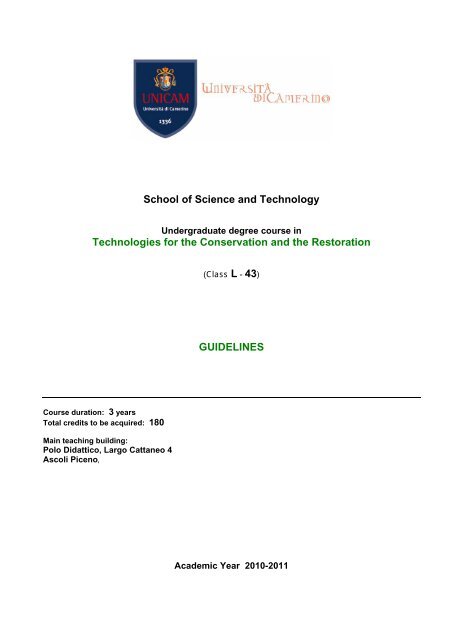
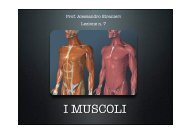
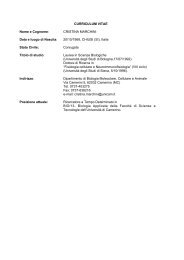
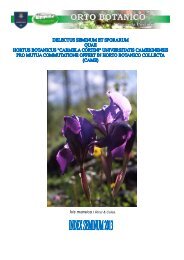
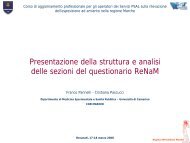
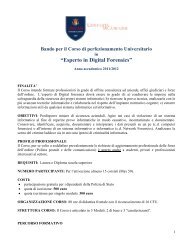
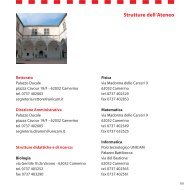
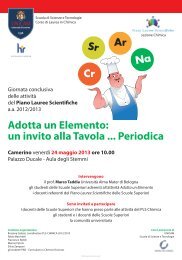
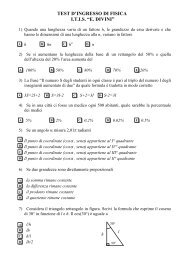
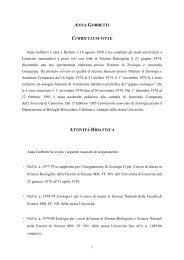
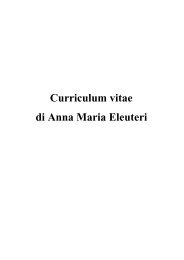
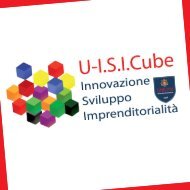
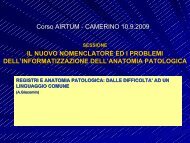
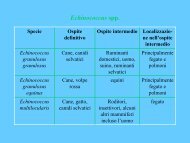
![PROGRAMMA [pdf] - Università degli Studi di Camerino](https://img.yumpu.com/15881781/1/184x260/programma-pdf-universita-degli-studi-di-camerino.jpg?quality=85)
